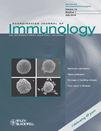
SCANDINAVIAN JOURNAL OF IMMUNOLOGY
Scope & Guideline
Advancing Immunological Insights for a Healthier Tomorrow
Introduction
Aims and Scopes
- Clinical Immunology and Autoimmunity:
Research on autoimmune diseases, including the mechanisms underlying conditions such as rheumatoid arthritis, lupus, and multiple sclerosis, as well as the role of autoantibodies in disease progression. - Infectious Disease Immunology:
Studies investigating immune responses to infectious agents, including viruses like SARS-CoV-2 and bacteria such as Mycobacterium tuberculosis. This area often includes vaccine research and the immune response to infections. - Translational Immunology:
Research that bridges basic immunological science with clinical applications, including studies on immunotherapies for cancer, the role of immune cells in transplantation, and the development of novel therapeutic strategies. - Microbiome and Immune Interactions:
Exploration of how the human microbiome influences immune responses, particularly in relation to inflammatory and autoimmune diseases, and its role in maintaining immune homeostasis. - Innate and Adaptive Immunity:
Basic research focusing on the mechanisms of innate and adaptive immune responses, including cell signaling pathways, immune cell differentiation, and the role of various cytokines and chemokines. - Immunological Techniques and Methodologies:
Development and application of novel methodologies for studying immune responses, such as high-plex analysis, single-cell sequencing, and advanced imaging techniques.
Trending and Emerging
- COVID-19 Immunology:
Research specifically addressing the immune response to SARS-CoV-2, including vaccine efficacy, immunopathology, and the long-term effects of COVID-19 on immune function. - Cancer Immunotherapy:
An increasing focus on the mechanisms and efficacy of immunotherapies for various cancers, including studies on immune checkpoint inhibitors and the role of the tumor microenvironment in shaping immune responses. - Precision Medicine in Immunology:
Emerging interest in personalized approaches to immunology, including genetic and molecular profiling to tailor treatments for autoimmune diseases and cancer. - Role of the Microbiome in Immune Function:
Growing research on how gut and other microbiomes interact with the immune system, influencing health outcomes and disease susceptibility. - Neuroimmunology:
A rising trend in exploring the interactions between the immune system and the nervous system, particularly in relation to autoimmune diseases affecting the central nervous system.
Declining or Waning
- Traditional Vaccine Research:
While vaccine research remains important, the focus on traditional vaccines has waned as the field shifts towards mRNA and novel vaccine platforms, particularly in light of recent advancements in COVID-19 vaccine technology. - Basic Immunology without Clinical Relevance:
There appears to be a decreasing trend in purely basic immunology studies that do not connect to clinical implications or applications, as the journal increasingly favors translational research. - Historical Perspectives on Immunology:
There has been less emphasis on historical analyses and reviews of past immunological theories and concepts, as the journal moves towards more contemporary and applicable research themes.
Similar Journals
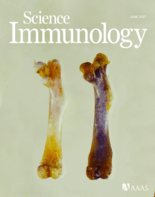
Science Immunology
Fostering Interdisciplinary Dialogue in ImmunologyScience Immunology, published by the American Association for the Advancement of Science, is a leading journal in the field of immunology, recognized for its significant impact and rigor in advancing our understanding of immune responses and complex diseases. With an impressive impact factor that places it in the Q1 category of both immunology and allergy, as well as miscellaneous medicine, this journal is ranked #7 and #8 in their respective Scopus categories, reflecting its high-quality research output. Since its inception in 2016, Science Immunology has been at the forefront of interdisciplinary immunological research, fostering crucial insights that link immunology with pressing health challenges. The journal is committed to providing open access to its content, ensuring that groundbreaking findings are accessible to a global audience of researchers, professionals, and students. Its anthology not only addresses fundamental immunological mechanisms but also enhances the dialogue on translational applications and therapeutic interventions, solidifying its position as an essential resource within the scientific community.

JOURNAL OF IMMUNOLOGY
Unveiling the Secrets of ImmunityWelcome to the JOURNAL OF IMMUNOLOGY, a prestigious publication associated with the American Association of Immunologists and dedicated to advancing the field of immunology. With a rich history dating back to 1945, this journal is renowned for its high-impact research, evident in its notable 2023 Q1 rankings in both Immunology and Allergy, as well as its strong positions in Scopus rankings—Rank #68 in Immunology and Allergy and Rank #79 in Immunology and Microbiology. Although it operates on a subscription basis, its commitment to publishing cutting-edge studies ensures that it remains a vital resource for scientists, healthcare professionals, and students alike. As the journal continues to pave the way for innovative research and breakthroughs in immunological science, it facilitates a platform for dialogue and discovery among researchers and practitioners across the globe.
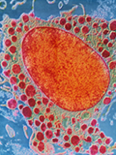
Annual Review of Immunology
Unraveling the Complexities of ImmunityThe Annual Review of Immunology, published by Annual Reviews, is a premier journal that has been contributing to the field of immunology since its establishment in 1983. With a strong reputation highlighted by its impressive impact factor and top-tier rankings—holding the Q1 category in both Immunology and Immunology and Allergy, alongside significant Scopus Rankings—this journal serves as an essential resource for researchers, professionals, and students alike. The Annual Review of Immunology covers the latest advancements and critical developments in the domain, fostering a better understanding of immune responses and disorders. Although it is not an open-access journal, it provides comprehensive reviews that synthesize emerging data and trends, making it indispensable for those at the forefront of immunological research. With volumes anticipated through 2024, it continues to set the standard for high-quality scholarly publications in the field.

Immunity
Pioneering research in immunity and infectious diseases.Immunity is a premier journal published by CELL PRESS that has positioned itself at the forefront of immunological research since its inception in 1994. With its ISSN 1074-7613 and E-ISSN 1097-4180, this prestigious journal is recognized for its significant contribution to the fields of Immunology, Allergy, and Infectious Diseases, consistently achieving a Q1 ranking in these categories as per 2023 metrics. The journal is highly esteemed within the academic community, holding impressive Scopus rankings—4th out of 344 in Infectious Diseases and 3rd in both Immunology and Immunology and Allergy—placing it in the 98th percentile. Although not an Open Access journal, it provides critical insights and research developments that empower researchers, healthcare professionals, and students alike. With a commitment to advancing scientific knowledge, Immunity is crucial for those interested in understanding immune responses and their implications for health and disease.
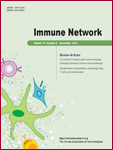
Immune Network
Advancing Immunology Through Innovative ResearchImmune Network is a prestigious journal dedicated to disseminating high-quality research in the field of immunology, infectious diseases, and allergy, under the esteemed KOREA ASSOCIATION OF IMMUNOLOGISTS. Founded in 2016, this journal has quickly ascended to a top-tier publication, achieving Q1 rankings in 2023 in multiple relevant categories, including Immunology, Allergy, and Infectious Diseases. With a strong emphasis on innovation and interdisciplinary research, Immune Network appeals to a diverse audience of researchers, professionals, and students keen on advancing the understanding of immune responses and disease mechanisms. However, it is crucial to note that the journal operates under a subscription model without open-access provisions. Its impact factor further solidifies its reputation, reflecting the significant influence of the articles published. Located in South Korea, the journal serves as a global platform for sharing revolutionary insights and fostering collaborations within the immunology community.

IMMUNOLOGY AND CELL BIOLOGY
Fostering Knowledge in Immunology and Cellular MechanismsIMUNOLOGY AND CELL BIOLOGY, published by Wiley, serves as a prominent platform for disseminating cutting-edge research in the fields of immunology and cell biology. With an ISSN of 0818-9641 and an E-ISSN of 1440-1711, this journal has established itself since its inception in 1987, demonstrating a commitment to advancing knowledge in its disciplines through high-quality articles. Renowned for its rigorous peer-review process, it holds a Q2 quartile ranking in both immunology and cell biology categories as of 2023, showing its competitive stature in these fields. IMUNOLOGY AND CELL BIOLOGY is indexed among the elite journals worldwide, with impressive Scopus rankings, including a rank of #75/233 in Immunology and Allergy. The journal’s comprehensive scope ensures that it caters to an audience of researchers, professionals, and students who are dedicated to exploring the intricate mechanisms of immune responses and cellular interactions. Although it does not operate under an open access model, its subscription-based content remains invaluable for those seeking to broaden their understanding of immunology and cell biology. By providing a forum for significant scientific dialogue, IMUNOLOGY AND CELL BIOLOGY continues to shape the future of research in these vital areas.
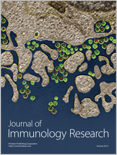
Journal of Immunology Research
Unlocking Immune Mechanisms: Where Discovery Meets AccessibilityJournal of Immunology Research, published by HINDAWI LTD, stands as a pivotal open-access journal in the realm of immunology, with a particular emphasis on advancing knowledge in both fundamental and applied aspects of the field. Since its inception in 1990, the journal has committed to the dissemination of high-quality research, earning a respectable impact factor that reflects its significance. Based in Egypt, it provides a platform for researchers from around the world, showcasing innovative studies and reviews that contribute to the understanding of immune system mechanisms. Its 2023 rankings place it in the Q2 category for Immunology and Allergy, and Q1 in the broader category of Medicine (miscellaneous), indicating a strong reputation among its peers. Through its open-access model, the journal promotes wide accessibility of cutting-edge research, catering to researchers, professionals, and students alike. With ambitions that converge through 2024, the Journal of Immunology Research continues to be an essential resource for those seeking to explore the forefront of immunological science.
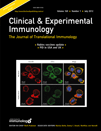
CLINICAL AND EXPERIMENTAL IMMUNOLOGY
Transforming Research into Clinical PracticeClinical and Experimental Immunology, published by Oxford University Press, is a premier journal that has been a cornerstone in the field of immunology since its inception in 1966. With an ISSN of 0009-9104 and an E-ISSN of 1365-2249, this journal holds a significant position in academic research, currently ranking in the Q2 category for both Immunology and Allergy (2023). Its impactful contributions are reflected in its Scopus rankings, where it stands at Rank #63 out of 233 in Immunology and Allergy, placing it in the 73rd percentile, and Rank #73 out of 236 in Immunology and Microbiology. Researchers, healthcare professionals, and students will find this journal an invaluable resource for cutting-edge studies, reviews, and clinical advancements in the ever-evolving domain of immunology. While the publication does not offer open-access options, it remains a pivotal platform for disseminating knowledge that impacts both clinical practice and experimental research.

Immunity Inflammation and Disease
Elevating the discourse on therapeutic strategies for inflammatory diseases.Immunity, Inflammation and Disease is a premier open-access journal published by WILEY, dedicated to advancing the field of immunology and allergy. Launched in 2013, this journal has established itself as a significant platform for researchers and professionals to disseminate high-quality research findings and innovative insights that address critical issues in immune responses and inflammatory diseases. With an impact factor that reflects its growing influence and a current ranking in Q3 for Immunology and Q2 for Immunology and Allergy, this journal serves a diverse audience keen on exploring cutting-edge developments. Researchers are encouraged to submit their work to share their findings with a global reach, foster collaboration, and enhance the understanding of immune mechanisms and therapeutic strategies. Accessible since its inception, Immunity, Inflammation and Disease is committed to open science, ensuring that vital research is freely available for the advancement of knowledge within the academic community and beyond.

Innate Immunity
Fostering Innovation in Immunological ResearchInnate Immunity, published by SAGE Publications Ltd, serves as a vital platform for disseminating cutting-edge research in the fields of immunology, microbiology, cell biology, and infectious diseases. With an ISSN of 1753-4259 and an E-ISSN of 1753-4267, this journal has been a prominent contributor to the academic community since its inception in 1996, focusing on the innate immune response and its implications for health and disease. Holding a respectable impact factor and categorized in the Q2 and Q3 quartiles across various relevant domains, Innate Immunity ranks competitively in major databases, including Scopus, where it appears in the top 75th percentile for Infectious Diseases. Researchers and professionals are encouraged to explore its wealth of articles that are pivotal in bridging fundamental immunology with clinical applications, fostering a deeper understanding of immune mechanisms vital for combating human diseases.